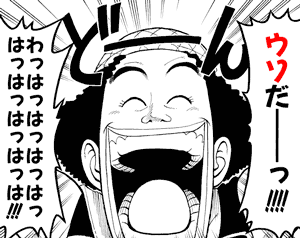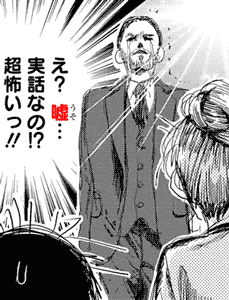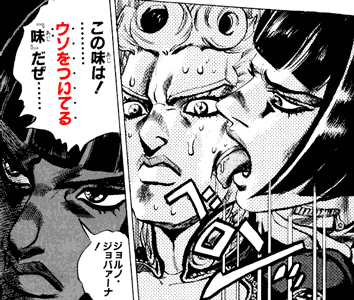In Japanese, uso 嘘 means a "lie," an "untruth," although it's often translated in other ways.
It's also spelled uso うそ and uso ウソ.
Manga: One Piece (Chapter 23, 〝キャプテン・ウソップ登場〟)
Meaning
Literally, uso 嘘 refers to a "lie." Grammatically, it's a noun.
- sore wa uso da
それは嘘だ
That is a lie.
In Japanese, the subject of a sentence, like the word "that," sore それ, above, is often the topic marked by the wa は particle. This topic can be omitted in certain situations, which is how you get:
- uso da!
嘘だ!
[It] is a lie!
Note that there's no word for the dummy pronoun "it" in Japanese. English needs the "it" because just "is a lie" would be syntactically wrong as a sentence, but Japanese has no such requirement, so it's common to have sentences with just the predicate alone like above.
Antonym
The antonym of uso 嘘 is hontou 本当, a "truth."
- hontou da!
本当だ!
[It] is a truth!
[It] is true!
Other words like shinjitsu 真実, "reality," honki 本気, "actual feelings," maji まじ, "for real (slang)" are often used, too.
Translation
Usually, uso da 嘘だ isn't translated to "it is a lie," because that sounds weird in English. A decent translator will translate it differently, to something more natural, like:
- That's a lie!
- No way!
- You're lying to me!
- I can't believe it!
The last one would become this in Japanese:
- shinjirarenai
信じられない
[I] can't believe [it].- shinjiru
信じる
To believe. (ichidan verb.) - ~rare
~られ
Able to. (potential jodoushi 助動詞.) - ~nai
~ない
Not. (negative jodoushi.)
- shinjiru
- Context: a very scary story turns out to be true, leaving characters stupefied with hair strands sticking out.
- e? uso...
え?嘘・・・
Eh? [No way]... - jitsuwa nano!?
実話なの!?
[It] is a true story? - chou kowai'!!
超怖いっ!!
[That] is super scary!!
Since uso da 嘘だ just says something is a "lie," sometimes it's used by party being lied to, but other times it's used by the party doing the lying, in which case it's translated to:
- Sorry, that was a lie.
- Got you.
- Gotcha.
- It was joke.
The last one being, in Japanese:
- joudan
冗談
[It is] a joke.
Manga: One Piece (Chapter 23, 〝キャプテン・ウソップ登場〟)
- uso da--'!!!!
ウソだーーっ!!!!
[I lied]!!!! - doon
どーん
(sound effect used when something suddenly comes to front on screen, in this case Usopp's face.) - wa'ha'ha'ha'ha'ha'ha'ha'ha'ha!!!
わっはっはっはっはっはっはっはっはっは!!!
*laugh*
Usage
The word uso 嘘 is a noun, so it's accompanied by the copula da だ. This copula can be inflected. For example:
- uso desu
嘘です
[It] is a lie. (polite form.)- uso de aru
嘘である
[It] is a lie. (literary form.)
- uso de aru
- uso datta
嘘だった
[It] was a lie.
[He lied to me].
[I lied to you].- uso deshita
嘘でした
(same meaning, polite form.) - zenbu uso datta
全部嘘だった
[It] was all a lie.
[Everything was a lie].
- uso deshita
- uso daro?
嘘だろ?
[It] is a lie, right?
[You're joking, right?]
[Surely that can't be true?]- uso desho?
嘘でしょ?
(same meaning, polite form.)
- uso desho?
- uso janai!
うそじゃない!
[It] isn't a lie!
[It is true! I'm not lying!]- uso de wa nai
嘘ではない
(same meaning, not a contraction.) - uso ja arimasen
嘘じゃありません
(same meaning, polite form.) - uso de wa arimasen
嘘ではありません
(same meaning, polite form, not a contraction.)
- uso de wa nai
In questions:
- uso ka?
嘘か?
[It] is a lie?
[It isn't true?]
[You lied to me?]- uso desu ka?
嘘ですか?
(same meaning, polite form.)
- uso desu ka?
Like other nouns, uso 嘘 can be used as no-adjective.
- {uso no} jouhou
嘘の情報
Information [that] {is a lie}.
False information. - {uso no} uwasa
嘘の噂
Rumors [that] {are lies}.
False rumors. - {uso no} sekai
嘘の世界
A world [that] {is a lie}.
A false world. - uso no kazoku
嘘の家族
A family [that] {is a lie}.
A fake family. - {uso no} you ni
嘘のように
Like [it] was a lie.- uso ka no you ni
嘘かのように
(same meaning, but with the ka か particle in the middle.)
- uso ka no you ni
- {{uso no} you na}, {hontou no} hanashi
嘘のような本当の話
A story [that] {is true}, [that] {looks like a lie}.
A true story that seems false.
A story that sounds like a lie, but is true.
Other basic phrases:
- uso mitai
嘘みたい
It appears [it] is a lie.
That sounds like a lie. That looks like a lie. - uso rashii
嘘らしい
I heard that [it] is a lie.
"To Lie" in Japanese
To say "to lie" in Japanese, you would say:
- uso wo tsuku
嘘をつく
To blow lies.
To lie.
- Context: Kuga Yuuma 空閑遊真 knows your habits.
- omae...... tsuman'nai uso φ tsuku ne
おまえ・・・・・・つまんないウソ つくね
You...... tell boring lies, [don't you]?
- tsuman'nai is a contraction of tsumaranai つまらない.
The verb tsuku 吐く means to put something out of your mouth, in this case, a lie, but it can also be used to say other things, like "to sigh."
This verb is sometimes used in the imperative form meireikei 命令形 to criticize something for lying:
- uso wo tsuke!
嘘をつけ!
Lie! (literally, it would be an order)
[Stop lying!] (what it normally means.)
Other conjugations:
- uso wo tsuita
嘘をついた
Lied. - uso wo tsuite-iru
嘘をついている
To be lying.
To have lied. - uso wo tsuite-inai
嘘をついていない
To not be lying.
To not have lied. - {uso wo tsukanai} hito wa inai
嘘をつかない人はいない
A person [who] {doesn't lie} doesn't exist.
Some similar words include:
- gomakasu
誤魔化す
To fool. To trick. To swindle. - gomakashita
誤魔化した
To have fooled. To have tricked. To have swindled. - damasu
騙す
To deceive. To trick. - damashita
騙した
To have deceived. To have tricked.
"Liar" in Japanese
A liar is someone who lies. Since "to lie" is uso wo tsuku, then a "liar" is:
- uso-tsuki
嘘つき
A liar.- tsuki is the noun form of the verb tsuku, and "liar" is a noun.
Do note that sometimes "liar" is translated in place of other phrases. Notably:
- peron'
ペロンッ
*lick* (phenomime) - kono aji wa!
この味は!
This taste [is]! - .........
- {uso wo tsuiteru} "aji" daze......
ウソをついてる『味』だぜ・・・・・・
A "taste" of {blowing lies}......
A "taste" of {lying}......
The taste of a liar......- ~teru is ~te-iru without i い.
- Joruno Jobaana!
ジョルノ・ジョバァーナ!
Giorno Giovanna!




Though it was noting knew, since I started studying Japanese. I find your articles so entertaining and easy to understand. I just discoverd them and have already read like 5 of them, just because they are so fun to read! Thank you so much for writing them
ReplyDelete"Also there's no word for 'it' in Japanese, that is assume too."
ReplyDeleteWhat about "それ" (sore)? Like many things in Japanese, it's not an EXACT translation and depends on context (for instance, it can also be "that" depending on the sentence), but it is the Japanese equivalent in how it's used as far as I can tell.
In English, the word "it" is often added to sentences because of syntactic requirements. The grammar syntax needs you to explicitly say the subject and the object, and "it" is the closest thing to implicit you can have. In Japanese, there's no such grammar syntax requirement, so you can omit the subject and the object, so there's no need in Japanese for this use of "it" to exist, thus, it doesn't exist.
DeleteThe gender-neutral "it" or "they" doesn't exist either. You can say sore それ, soitsu そいつ for things, sono hito その人 for people, but those words are closer to "that" than to "it". E.g.: that thing, that one, that person, and so on.
So I don't think there a word for "it" in Japanese.